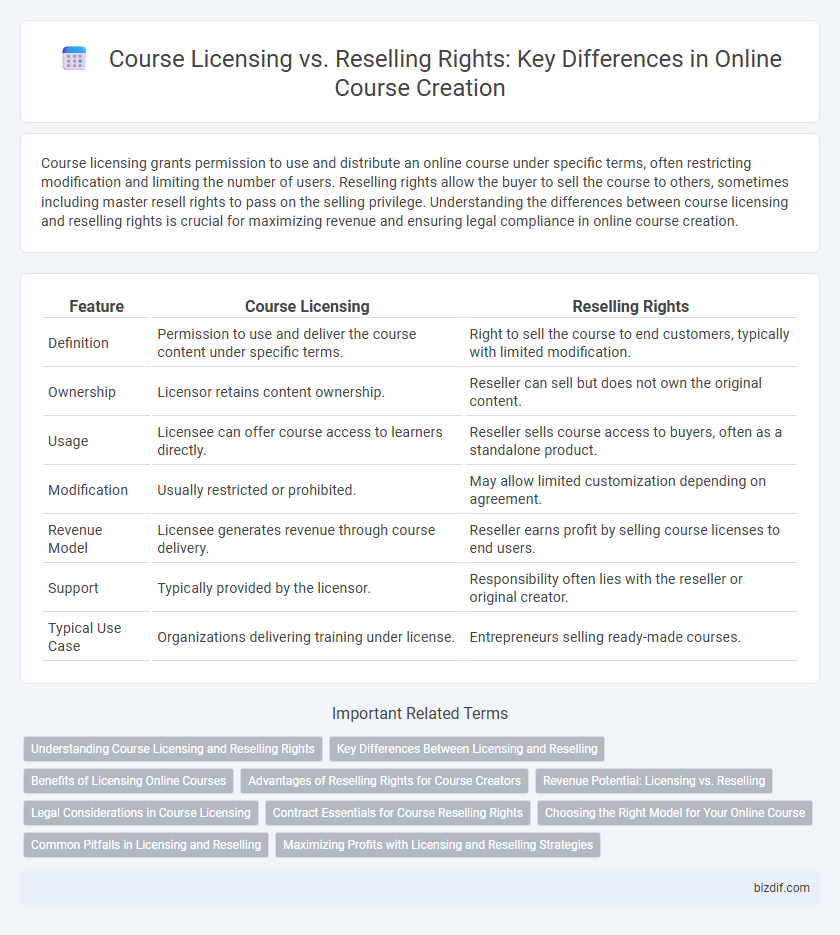Course licensing grants permission to use and distribute an online course under specific terms, often restricting modification and limiting the number of users. Reselling rights allow the buyer to sell the course to others, sometimes including master resell rights to pass on the selling privilege. Understanding the differences between course licensing and reselling rights is crucial for maximizing revenue and ensuring legal compliance in online course creation.
Table of Comparison
| Feature | Course Licensing | Reselling Rights |
|---|---|---|
| Definition | Permission to use and deliver the course content under specific terms. | Right to sell the course to end customers, typically with limited modification. |
| Ownership | Licensor retains content ownership. | Reseller can sell but does not own the original content. |
| Usage | Licensee can offer course access to learners directly. | Reseller sells course access to buyers, often as a standalone product. |
| Modification | Usually restricted or prohibited. | May allow limited customization depending on agreement. |
| Revenue Model | Licensee generates revenue through course delivery. | Reseller earns profit by selling course licenses to end users. |
| Support | Typically provided by the licensor. | Responsibility often lies with the reseller or original creator. |
| Typical Use Case | Organizations delivering training under license. | Entrepreneurs selling ready-made courses. |
Understanding Course Licensing and Reselling Rights
Course licensing grants permission to use educational content under specific conditions defined by the licensor, often limiting modification and distribution methods. Reselling rights allow purchasers to sell the course to others, sometimes including the option to customize content or provide bonuses. Understanding the distinctions between these rights is crucial for instructors and entrepreneurs aiming to maximize revenue while respecting intellectual property laws.
Key Differences Between Licensing and Reselling
Course licensing grants permission to use, modify, or distribute an online course under specific terms, often limiting the scope and duration of usage. Reselling rights allow the buyer to sell the course to others, typically without modification, enabling the creation of new revenue streams. Licensing focuses on controlled access and usage restrictions, while reselling emphasizes ownership transfer and profit generation from course sales.
Benefits of Licensing Online Courses
Course licensing offers extensive control over content use, allowing creators to grant permissions while retaining ownership, ensuring consistent brand representation. Licensing enhances revenue streams by enabling multiple users to access courses under specific terms without transferring full rights. This approach safeguards intellectual property, reduces unauthorized distribution, and streamlines legal enforcement compared to reselling rights.
Advantages of Reselling Rights for Course Creators
Reselling rights empower course creators to expand their reach rapidly by leveraging a network of resellers who promote and sell the course on their behalf, increasing revenue streams without additional marketing efforts. This model reduces workload and enhances scalability, as creators receive royalties or a percentage of each sale without managing individual customers. By offering reselling rights, creators capitalize on broader market exposure, driving passive income and accelerating brand growth efficiently.
Revenue Potential: Licensing vs. Reselling
Course licensing typically offers higher revenue potential through recurring fees and broader usage rights, allowing multiple users or platforms to access the content under agreed terms. Reselling rights often generate one-time income by permitting buyers to sell the course as is, limiting ongoing earnings but providing quick capital. Choosing licensing maximizes long-term profitability, while reselling suits creators seeking immediate returns with less involvement in distribution.
Legal Considerations in Course Licensing
Course licensing involves granting specific legal permissions for the use, distribution, and modification of online course content, establishing clear intellectual property boundaries to protect creators. Reselling rights typically allow purchasers to sell the course but may restrict content alterations or redistribution methods. Ensuring compliance with copyright laws and specifying usage limitations in licensing agreements prevents legal disputes and secures the creator's ownership rights.
Contract Essentials for Course Reselling Rights
Course reselling rights contracts must clearly define usage permissions, payment terms, and content exclusivity to avoid legal disputes. Essential clauses include the scope of redistribution, intellectual property protections, and duration of the license. Ensuring these elements in course reselling agreements safeguards both creators and resellers, promoting transparent and efficient transactions.
Choosing the Right Model for Your Online Course
Course licensing grants educators permission to use or distribute content under specific conditions, ensuring control over how the material is accessed and adapted. Reselling rights empower buyers to sell the course to others, often with fewer restrictions but less control over quality and branding. Selecting the appropriate model depends on your goals for scalability, revenue, and maintaining course integrity in the competitive online education market.
Common Pitfalls in Licensing and Reselling
Course licensing often involves strict limitations on distribution and modification, which can lead to legal issues if ignored. Reselling rights may appear straightforward but frequently include hidden restrictions that impact revenue potential and content control. Understanding the specific terms and obligations in both licensing and reselling agreements is crucial to avoid unintended copyright infringements and financial losses.
Maximizing Profits with Licensing and Reselling Strategies
Course licensing allows creators to authorize others to use their content under specific conditions, generating ongoing revenue streams without relinquishing ownership. Reselling rights enable partners to sell courses directly, often expanding market reach and accelerating sales volume. Combining licensing agreements with reselling rights optimizes profit potential by leveraging both passive income and active distribution networks.
Course licensing vs Reselling rights Infographic

 bizdif.com
bizdif.com